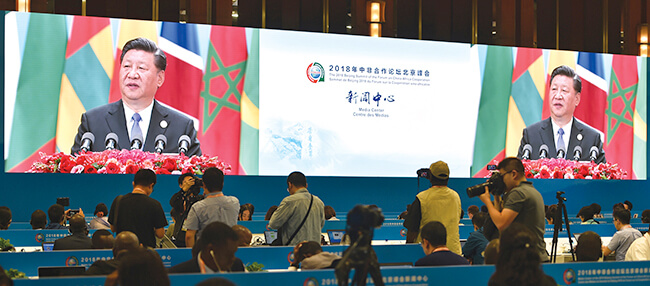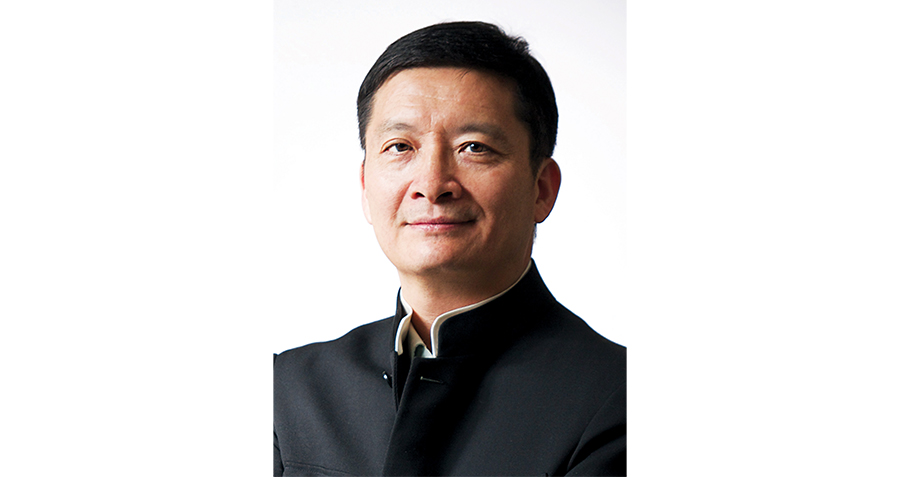Pronouncements that the Belt and Road Initiative is failing are premature, argues Tom Miller, author of China’s Asian Dream and Senior Asia Analyst at Gavekal Research
 Tom Miller is well-versed in the problems facing the Belt and Road Initiative (BRI). He predicted many of them. In his 2017 book China’s Asian Dream, he warned that China’s preference for cultivating close relationships with individual leaders could be a long-term risk for BRI. Eighteen months on, this looks prescient. New governments have won power in Malaysia, Pakistan and the Maldives, and renegotiating deals signed by their predecessors are high on the agendas.
Tom Miller is well-versed in the problems facing the Belt and Road Initiative (BRI). He predicted many of them. In his 2017 book China’s Asian Dream, he warned that China’s preference for cultivating close relationships with individual leaders could be a long-term risk for BRI. Eighteen months on, this looks prescient. New governments have won power in Malaysia, Pakistan and the Maldives, and renegotiating deals signed by their predecessors are high on the agendas.
These setbacks have led to an avalanche of negative press concerning BRI, with many criticizing China’s lending practices and declaring the BRI is doomed to fail. Miller explains it is far too early to make that call.
Q. The media narrative on BRI has changed recently. What is the status of the initiative?
A. If you see Belt and Road primarily as an infrastructure-building initiative, which I do, then it’s a very long-term initiative, and only at the beginning. Yet, some in the investor world have already declared BRI a failure. I think that’s silly as it is too early to judge. Many of the BRI projects haven’t started yet or are still in the early stages.
In places like Pakistan, the things they have built are ‘early harvest’ projects. That’s a weird Chinese term that means putting basic infrastructure in place and implies the payoff happens later. So far, they’ve built power stations, power grids and so on. Pakistan used to have a massive electricity deficit and China has been helping to solve that. Once you build the power grids, roads and industrial zones, then investment can come in and hopefully the projects become a commercial success. Now, I’m not saying that they will be a success—maybe the industrial zones will remain empty. But it’s a fair point. You have to build the hardware first and the return on investment comes later.
I have a bias here that comes from experience. When China started building its high-speed rail network in 2008, I thought this was excellent. China needed it, and it was better to build it while labor was cheap. But there were many, particularly in the West who came out of banking and are brought up to believe that all that matters is return on investment, who were incredibly negative. They saw it as a massive waste of money. Some still argue that the high-speed railways have not made a commercial return, but would anyone seriously say that it has not been a phenomenal success? Such schemes take time for the payoffs to be clear.
Q. At the moment, much of the criticism is focused on China’s so-called ‘debt-trap diplomacy.’ What is your view on this debate?
A. The question is whether China is deliberately setting out to entrap countries. It is possible that there is such strategic thinking: one of the aims of BRI is to create economic linkages that then give China leverage. But I’m reluctant to say that China is deliberately trying to entrap countries. Rather, I think this can naturally happen when countries, like Sri Lanka, take on a huge amount of debt.
Of course, some will say that, whether it’s the aim or not, the effect is the same and some in the Western press are labelling China a ‘neocolonial power’ because of it, but I’m not convinced. In the case of Malaysian Prime Minister Mahathir Mohamad, who warned of a ‘new form of colonialism’ during a summit in Beijing in August, I suspect that he was being politically clever. He’s the new guy in power, clearly some dodgy deals were done in the past and he wants to renegotiate to ensure the best outcome for his country. But I’m not sure you can accuse China of colonial behavior in Malaysia. Is it really colonial behavior to offer people lots of money, and then when they say yes, to give it to them?
I think the more colonial attitude actually comes from Western critics, who do not see these ‘small, pathetic countries’ as having any self-determination capabilities. They are seen as simply being unable to say no to China. I was recently at an event with the Pakistani high commissioner in London, who became highly irritated when someone put forth the argument that Pakistan wasn’t capable of deciding for itself what it wanted.
Q. Does the pushback from countries like Pakistan and Malaysia represent a long-term threat to BRI?
A. We’ll see what happens in Malaysia and Pakistan, but it’s too early to say that China is being cut out of projects there. It’s worth pointing out the example of Sri Lanka where something similar was happening three years ago. A new government comes into power; China had done dodgy deals with the previous administration; and the new guys come in and say, ‘we want to clean this up.’
When I interviewed Sri Lanka’s finance minister, he told me that they were going to renegotiate the loans and that they were also going to obtain loans elsewhere. In the end they couldn’t because nobody else wanted to lend them any money. Now, they’re more beholden to China than ever before.
Critics will say that this is example of the debt trap, that it was a deliberate ploy, but actually, Sri Lanka wanted Chinese investment. What they were annoyed about was the loans. They wanted more equity investment, and now China is doing more of that. The point is that China’s position in Sri Lanka is stronger than before, and in that sense—from China’s point of view—it has been a success.
Clearly, in some cases China has offered more money than some countries can afford, but China is learning too. I personally think that the renegotiation of loans in Malaysia and other countries is positive—not just for those countries, but for China too. Why would China want to throw away money on investments that are not commercial?

Q. In China’s Asian Dream, you wrote that Chinese officials privately admitted that they expected to lose 80% of the money loaned to Pakistan for BRI projects. Does that still stand?
A. I got this from a good analyst, who said that someone well-connected in Beijing told her this was the rule of thumb among officials. I doubt that there is an official line, but it was the way people in Beijing were thinking. It does tell you that there is a strategic element to the China-Pakistan Economic Corridor (CPEC). If you’re willing to lose money, it must be for a good reason.
But I expect that equation changes for different countries. There are strategic reasons to want a good grip on Pakistan. It borders Xinjiang. And in Myanmar, where China wants access to the Bay of Bengal, it may make strategic sense to lose money on certain projects. But that might not be the case in Malaysia.
Pakistan is also different because China does not really have allies, but Pakistan is as close as it gets. China has also been in Pakistan for a very long time. Think of the Karakoram Highway, which they built in the 1980s. Many CPEC projects have been going on for a long time—long before President Xi Jinping came up with the concept of the BRI.
CPEC could be incredibly useful for Pakistan. The problem is that China often goes overboard. It is pushing a Chinese investment model that worked for China but has been incredibly wasteful and inefficient. China has a particular political economy that allows it to use this model without collapsing, but partner economies are different: they will not be able to absorb that kind of money in the same way.
Q. To what extent have China’s investment and lending practices changed since BRI began in 2013?
A.In a way, not much. China has been doing all this for a long time, particularly in countries like Venezuela. I guess the difference is that China is not lending for resources. There has been a shift over the last decade. Now, they are doing it because they have expertise and can build stuff, and Chinese companies can do well out of it. They’re also trying to create economic partnerships, and through that suck countries into their economic orbit.
In terms of the way loans are structured, it’s very opaque. But one thing that is changing is that China is moving more toward concessionary loans, loans with substantially more generous terms than market loans. Based on data compiled by William and Mary University, I also calculated that China’s aid disbursement was around $100 billion between 2000 and 2014. During that period, the US gave out $366 billion. China still gave out a lot of aid, but I think you’ll see more coming from China in the future.
At the National People’s Congress this year, Beijing announced a new International Development Cooperation Agency and said that they want to classify foreign aid as an instrument of great power diplomacy. It sounds as though they have decided to behave more like the big developed countries do.
Q. There were some negative comments in China following the announcement of a new aid and investment package for Africa at the Forum on China-Africa Cooperation (FOCAC) in September, with some arguing the money should be invested domestically. Will this influence policy?
A. My wife is from Beijing and normally does not pay attention to foreign policy news, but she and her friends discussed this issue when the $60 billion package was announced. I think there will be more discussions like that and Beijing does have to be careful. But they can get away with a lot because of the political system. And of course, they will portray this as a way of making China great again, as Xi Jinping has done with his talk of the ‘great rejuvenation of the Chinese nation.’ I doubt there’ll be enough popular pressure for them to dial back their grand plans overseas. But it may make them think a little harder about the value of those investments, so that they do not appear to be throwing money away.

Q. China’s Asian Dream predicted that China’s preference for dealing with individual leaders could prove counterproductive. Recent events in Malaysia and Pakistan support that. Are there signs that China is changing its approach?
A. It does not seem to have changed. In fact, China doesn’t have a lot of choice in some countries. If they’re dealing with either authoritarian regimes or imperfect democracies, who else do they go through? I think they will continue to deal with individuals at the top, but they’re going to have to learn that it doesn’t pay to pay off cronies of leaders. In democratic countries, it will come back and slap you in the face.
Q. How do you see BRI developing over the next five years?
A. Xi Jinping is not going to step back from it. I think he made this clear at the symposium marking the fifth anniversary of the BRI in August. China may become more careful in how it lends money and may try to be more sensitive to the financial burden it imposes on other countries, but the policy is not going to change. I think we will still be talking about it in five years’ time.

















